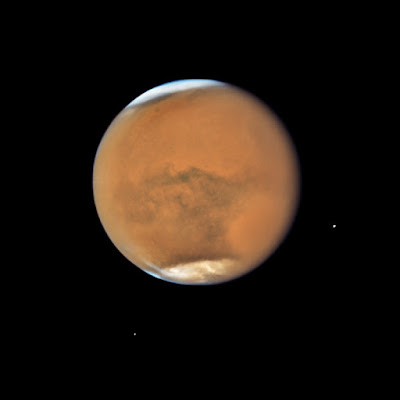Disappearing Atmosphere on Mars
Seems like a nice place, but it could do with a little atmosphere... Actually, Mars is not such a nice place, what with being so cold, huge dust storms, static electricity, mostly desert, a possible "lake" which would have poison water, and all. The atmosphere is 100 times thinner than ours, so heat does not have much incentive to linger. Scientists have known for a long time that its atmosphere was thin. Now they've learned that what little it has is going away.
The atmosphere depletion is a cause for concern among deep time proponents. Using their lower limits, scientists have a passel of problems keeping Mars old. Rescuing devices for cosmic evolution cause more problems than they solve. Simply put, Mars and the rest of the solar system are young — all were created recently, as we keep seeing from the evidence time and time again.
 |
| Mars having a dust storm, and its two moons are also in the picture Credit: NASA, ESA, and STScI (usage does not imply endorsement of site contents) |
Measurements of Martian atmospheric loss rates imply incredible changes over the assumed billions of years of Mars’ history.To continue reading, click on "Mars Is Losing Its Atmosphere Fast".
Either Mars is younger than thought, or its atmosphere was unbelievable billions of years ago. The MAVEN spacecraft (Mars Atmosphere and Volatile Evolution), launched in 2013, has taken atmospheric escape measurements for an entire Martian year. A Mars year is 687 Earth-days. How fast is gas being lost from the atmosphere? Quick answer is 1 to 2 kilograms per second. A report in Icarus does the math for moyboy assumptions that Mars formed 4.5 billion years ago.